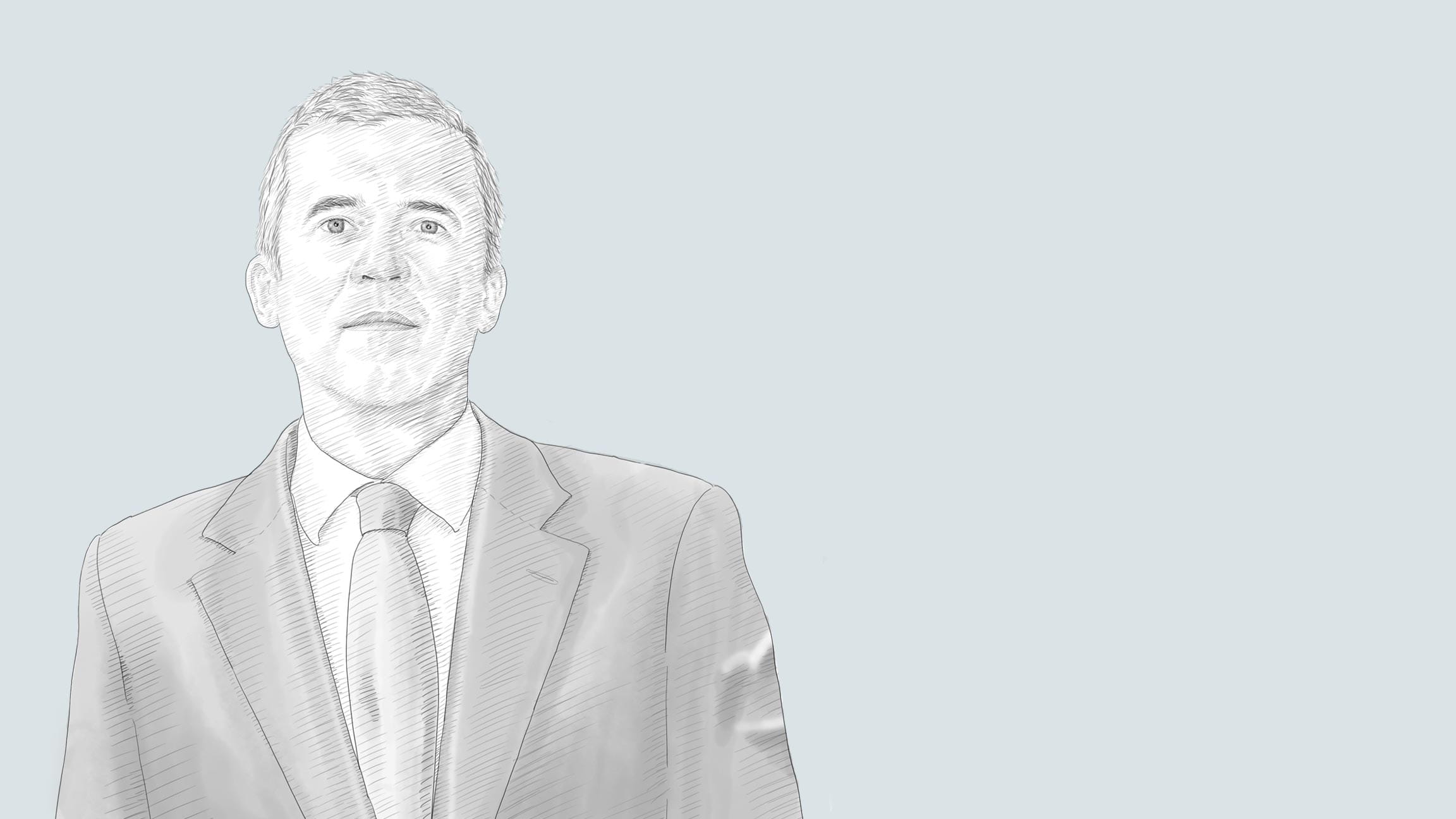Interview with Andreas Utermann

Summary
Andreas Utermann, CEO and Global CIO, Allianz Global Investors, talks to Kerstin Keller, Head of Institutional Marketing and Editor-in- Chief Update Magazine, about the new brand positioning “Active is”.
 |
Update Magazine II/2018 |
Allianz Global Investors has sharpened its value proposition and brand positioning, with “Active is” becoming the key statement. What does ‘active’ mean to you?
Andreas Utermann: First, “Active is” reflects our
commitment to active asset management. Too
often, active management is seen solely as a
job of selecting securities and measuring
performance against a benchmark index. While
that’s a core part of what we do, we think active
management involves a broader partnership
built around identifying clients’ needs.
We can use a diversified toolkit of strategies to
meet those needs, and adjust the approach as
required over the long term. Our toolkit includes
expert capabilities within and across asset
classes, that help us guide clients in a way that
is truly product-agnostic.
Whatever the arguments for active management,
however, active managers need to show that they
represent fair value. Our innovative pricing model
is one way in which we seek to build a common
understanding with clients of where and how we
add value.
Over the past year, with our “Active is”
positioning, we have refined our positioning to
accentuate our commitment to active, and set
ourselves apart in the marketplace.
But “Active is” doesn’t just reflect our commitment
to active asset management. Being active is
part of our DNA: it means leading change, taking
ownership, working flexibly and challenging
ourselves – among other aspects.
All of these commitments come together in our
brand promise – “Value. Shared.” – which
underscores our mission to work with clients to
address their challenges for the long run.
Why is active management important right now, and what difference does it make for clients?
Andreas Utermann: Asset management is still
a fast-growing industry, yet it faces continued
scrutiny from investors and regulators alike.
Asset managers’ profit margins are tightening,
and we anticipate more industry consolidation as
a result. We expect the number of leading asset
management firms to reduce from the current
200 or so to less than 50 players in the near
future. Meanwhile, trust in the industry remains
low, and clients’ expectations continue to
increase.
And, while passive investment vehicles have
grown popular against the backdrop of a
prolonged bull market, they may not position
investors well when conditions – and
opportunities – change. Faced with a more
muted return outlook over the next five to
10 years, investors will need ways to work
their money harder.
Many investors are looking for alternative types
of investment that may deliver uncorrelated
returns.
Investors are demanding greater transparency
from their advisers: they want to know that the
fees they pay reflect the performance they are
achieving.
Against this backdrop, we are focused on several
key projects that support our vision to be a global
active asset management leader. For example,
we’re simplifying our operational backbone, and
creating a global, state-of-the art and flexible
enterprise architecture.
We continue to expand our active conviction and
alternatives investment offering. We’re extending
and diversifying our distribution footprint, and
we’re accelerating our digital transformation.
And, of course, we’re strengthening our brand to
emphasise the value we can add.
We hope that clients rely on us to be a trusted
and valued partner who puts their needs first.
You said that your “Value. Shared.” brand promise underscores your commitment. What does “Value. Shared.” stand for?
Andreas Utermann: We are one of the few
truly global asset managers dedicated to
active management, managing more than
EUR 500 billion in assets for individuals, families
and institutions.
With “Value. Shared.”, we want to show that asset
management generates long-lasting value, not
just for our clients but for all of our stakeholders.
We also have a broader social role to play.
Reflecting investors’ increasing desire to influence
companies and society, we are integrating
environmental, social and governance (ESG)
factors into our investment process. Not only does
this enable us to identify material risks, it allows
us to engage with companies to enhance
governance and drive improved performance.
Other examples of our commitment to “Value.
Shared.” include our ability to co-invest in the
products that we recommend to clients. Many
clients find this attractive, especially for our
illiquid offering. From our perspective, co-investing gives us an even deeper understanding
of the outcomes that clients are looking to
achieve.
We also develop products in partnership with our
clients, to find the solutions that work best for
them. This involves very engaging and productive
discussions to understand their needs.
And our ability to deliver on these objectives is
helped greatly by our internal culture of
partnership and collaboration. We build teams
and projects that cut across functional lines to
maximise idea-generation and move quickly
from planning to action.
Our “Value. Shared.” commitment manifests
itself in many ways, but ultimately it’s sharing
our clients’ journeys for the long run, adding
value in a cost-efficient way – including
through innovative fee structures – and staying
focused on where the next big opportunities
are coming from.
Investing involves risk. The statements contained herein may include statements of future
expectations and other forward-looking statements that are based on management‘s current
views and assumptions and involve known and unknown risks and uncertainties that could
cause actual results, performance or events to differ materially from those expressed or implied
in such statements. We assume no obligation to update any forward-looking statement. The
value of an investment and the income from it may fall as well as rise and investors may not get
back the full amount invested. There is no guarantee that the strategy will succeed and losses
cannot be ruled out. Investors may not get back the full amount invested.
The volatility of fund unit prices may be increased or even strongly increased. Past
performance is not a reliable indicator of future results. If the currency in which the past
performance is displayed differs from the currency of the country in which the investor resides,
then the investor should be aware that due to the exchange rate fluctuations the performance
shown may be higher or lower if converted into the investor’s local currency.
This is for information only and not to be construed as a solicitation or an invitation to make an
offer, to conclude a contract, or to buy or sell any securities. The products or securities described
herein may not be available for sale in all jurisdictions or to certain categories of investors.
This is for distribution only as permitted by applicable law and in particular not available to
residents and/or nationals of the USA. The investment opportunities described herein do not
take into account the specific investment objectives, financial situation, knowledge, experience
or particular needs of any particular person and are not guaranteed. The views and opinions
expressed herein, which are subject to change without notice, are those of the issuer and/or its
affiliated companies at the time of publication. The data used is derived from various sources,
and assumed to be correct and reliable, but it has not been independently verified; its accuracy
or completeness is not guaranteed and no liability is assumed for any direct or consequential
losses arising from its use, unless caused by gross negligence or willful misconduct. The
conditions of any underlying offer or contract that may have been, or will be, made or
concluded, shall prevail.
Contact the issuer electronically or via mail at the address indicated below for a free copy of
the sales prospectus, the incorporation documents, the latest annual and semi-annual financial
reports and the key investor information document in English. Please read these documents –
which are solely binding – carefully before investing.
This is a marketing communication issued by Allianz Global Investors GmbH, www.allianzgi.com,
an investment company with limited liability, incorporated in Germany, with its registered office at
Bockenheimer Landstrasse 42–44, 60323 Frankfurt/M, registered with the local court Frankfurt/M
under HRB 9340, authorised by Bundesanstalt für Finanzdienstleistungsaufsicht (www.bafin.de).
Allianz Global Investors GmbH has established branches in the United Kingdom (Allianz Global
Investors GmbH, UK branch, 199 Bishopsgate, London, EC2M 3TY, www.allianzglobalinvestors.
co.uk; subject to limited regulation by the Financial Conduct Authority, www.fca.org.uk), France
(Allianz Global Investors GmbH, France branch, www.allianzgi.fr; subject to limited regulation by
Autorité des Marchés Financiers, www.amf-france.org)., Italy (Allianz Global Investors GmbH, Italy
branch, via Durini 1, 20122 Milan; subject to regulation by the competent Italian Authorities in
accordance with the national legislation), Spain (Allianz Global Investors GmbH, Spain branch;
subject to limited regulation by Comisión Nacional del Mercado de Valores, www.cnmv.es),
Luxembourg (Allianz Global Investors GmbH Luxembourg Branch; subject to limited regulation
by Commission de Surveillance du Secteur Financier, www.cssf.lu) and the Netherlands (Allianz
Global Investors GmbH-Netherlands Branch; subject to limited regulation by Autoriteit Financiële
Markten www.afm.nl). Details about the extent of the local regulation are available from us on
request.
This report does not satisfy all legal requirements on the guarantee of impartiality in investment
recommendations and investment strategy recommendations and is not subject to any trade
restrictions prior to the publication of such recommendations. The duplication, publication, or
transmission of the contents, irrespective of the form, is not permitted.
Private Lending

Summary
The promissory note loan (Schuldscheindarlehen, SSD) continues to be used increasingly by corporates as a financing instrument. Even outside the banking market, the instrument is gaining importance for investors via private lending. As a result, a classic form of investment used by insurance companies could possibly be on the brink of re-invention as an alternative asset class.









